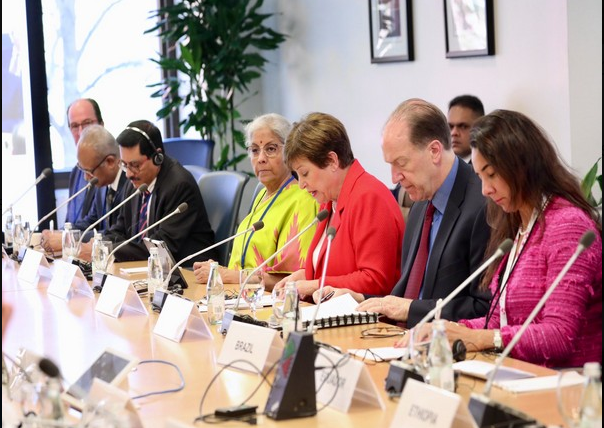
Sitharaman raises concerns about global economic outlook, geopolitical environment

Union Finance Minister Nirmala Sitharaman has expressed India’s concerns about the global economic outlook and geopolitical environment even though the country’s own growth rate is projected at over six per cent.
Speaking at the 107th meeting of the Development Committee, as part of the annual meeting of the International Monetary Fund (IMF) and the World Bank, in Washington on Wednesday (April 12), Sitharaman told global leaders that the current headwinds and strained global supply chains have put a tremendous pressure on the global economy, marked by persistently high interest rates, northbound inflationary pressures and currency depreciation.
‘People-centric approach to global challenges’
The recent turbulence in the banking sector in some advanced economies has further increased the challenges to global economic recovery and increased fiscal pressures, especially on EMDEs and LDCs, she said.
Watch | Nirmala Sitharaman’s top 5 statements in the US
Continued disruptions to global supply chains are still straining food, fuel and fertiliser supplies, and endangering food and energy security. This is disproportionately impacting the poor, the disadvantaged and the marginalised, particularly in the developing world, she added.
“The need of the hour is a people centric, equity driven, consensus-based, and collective approach to face global developmental challenges,” she said.
World Bank should evolve into a better, bigger bank: Sitharaman
Sitharaman said the aforementioned circumstances further challenge multilateralism and sought to encourage the World Bank Group (WBG) to “evolve into a bigger and better bank, which is fit for purpose to address the new world challenges”.
In her address, Sitharaman called upon all shareholders and stakeholders to adopt an innovative, bold and robust approach to transform the WBG into an institution capable of effectively addressing present and future challenges.
“We look forward to a WBG that deploys innovative ways to mobilises resources, unleashes its full potential as a solutions and knowledge bank, and fully leverages its comparative advantage to build a better world,” Sitharaman said.
Better growth projections for India
Sitharaman told the Development Committee that despite challenges and global headwinds, the IMF in its Global Economic Outlook forecasts above six per cent economic growth rate for India, making it the only major economy growing at that rate.
“With a manageable current account deficit and a growth rate highest among the major economies in the financial year 2023, the Indian economy has shown resilience in navigating the turbulence of the (COVID) pandemic as well as geopolitical spill-over,” she said.
The minister asserted that an optimistic business environment, robust industrial output and rapid vaccination coverage against COVID-19 have provided a strong momentum to the Indian economy, as evidenced by an estimated GDP growth of 9.1 per cent for the previous financial year.
India has moved on beyond the pandemic, staging a full recovery in FY22-23, ahead of many countries, and positioned itself in an upward pre-pandemic growth path, she said.
Also read: Government not in ‘crazy rush’ to sell everything: FM Nirmala Sitharaman
“The unparalleled (anti-COVID) vaccination drive has not only ensured quick economic recovery but also ensured economic prospects for this year and beyond. Successful implementation of agriculture and labour reforms have provided the boost for medium-term growth,” the minister said.
“India’s Long-Term Low-Carbon Development Strategy envisages a transition to a low-carbon development pathway that entails costs towards deployment of new technologies, development of new infrastructure and other transaction costs,” she added.
Also read: Budget 2023-24: How many words did Nirmala Sitharaman speak?
The finance minister said that the Union Budget has also pursued energy transition by encouraging domestic production of solar power equipment and batteries, in line with India’s climate commitments.
(With inputs from agencies)


